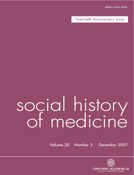-
Views
-
Cite
Cite
Steven Noll, Community Care in Perspective: Care, Control, and Citizenship, Social History of Medicine, Volume 20, Issue 3, December 2007, Pages 631–632, https://doi.org/10.1093/shm/hkm094
Close - Share Icon Share
Extract
In the past 50 years, a revolution has taken place in the care of those persons categorized as having learning difficulties, mental handicaps, mental retardation or developmental disabilities. Focusing on events in the United Kingdom, the individual pieces in Community Care in Perspective examines these changes from a variety of angles. They analyse both the promise and the reality of the movement towards community placement and examine the often competing rationales behind this transition. They also place community care in an international perspective, moving past an examination of the United Kingdom to look at the experiences of other industrialised nations grappling with the issues associated with re-integrating previously marginalised persons back into the mainstream of society. The book succeeds in providing a picture of a movement which has profoundly reshaped the dynamic between society and those labelled as mentally handicapped.
Definitions provide a key component in establishing an analytical framework for both the book as a whole and the articles within it. The very concept of those persons labelled as having learning difficulties has changed; so that Walmsley and Welshman can conclude in their introduction that ‘there is no direct correlation between early twentieth century “mental defectives” and those called “people with learning difficulties” today’ (p. 8). Community care itself is an amorphous phrase, with constantly shifting shades of meaning over both time and space. The concept changed from ‘an undesirable adjunct to institutional care … to a positive alternative which conjured up images of belonging to the mainstream’ (p. 9). The various authors examine this changing idea of community care in the context of the struggle between care and control in which there are the simultaneous notions of protection for and from those persons thought of as mentally handicapped. However, community care has seen an extension of that dichotomy to include the concern for citizenship, so that these persons can participate as fully as possible within society, receiving a ‘decent education, voting, marrying and having a family, expressing opinions, being treated with dignity and having protection under the law’ (p. 12).




